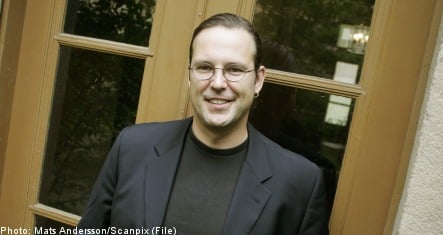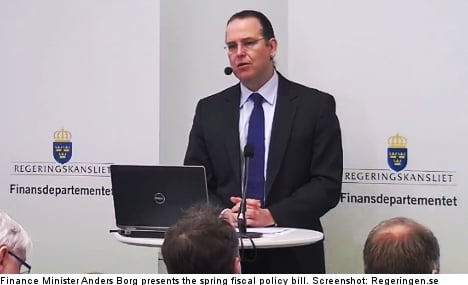Behind the “rocker” image, Swedish Finance Minister Anders Borg is a deft politician set to take centre-stage as Sweden’s EU presidency grapples with the fallout from the global financial crisis.
With his hair slicked back into a ponytail, sharp suits and an earring in his left ear, Borg is a million miles away from the normal stereotype of a government numbers guy.
Yet this 41-year-old former banker is one of the major players inside the Swedish government and a mastermind behind the centre-right Moderate Party’s rise to power with his long-time political allies, Prime Minister Fredrik Reinfeldt and Foreign Minister Carl Bildt.
Klas Eklund, senior economist at SEB and Borg’s former boss at the Stockholm-based bank, told AFP Borg is a highly intelligent and individual politician “who doesn’t fit into the grey, sometimes boring mould of finance ministers.”
“He is very quick, he reads profusely, he soaks up information like a sponge and he’s very receptive, very intelligent,” said Eklund.
“Before he became minister of finance, he was a technocrat, a brilliant technocrat. He was like a volcano, always erupting with new ideas,” he added.
Something of a libertarian during his teenage years — he once wrote a newspaper article calling on Sweden to decriminalize drugs — Borg’s politics shifted to the right in his twenties, becoming a staffer of the then prime minister Carl Bildt at the tender age of 23.
But when the Moderate Party lost the 1994 general elections, the young Borg changed tack again, embarking upon a career in finance before switching back to politics in 2002.
“He’s very much the centre of attention when he’s in a room, the kind of guy that you would immediately recognize, not only for his style, but also because he likes to speak,” said Peter Wolodarski, the chief political editor at Swedish daily Dagens Nyheter.
“He has opinions about everything, he knows everything. Or at least he speaks in a way that people think he knows everything,” he added.
Sweden’s Social Democrats, the main opposition party, say Borg’s perceived move to the centre is purely presentation and lacks substance.
“He knows how to play a role as an ordinary guy and to use the Social Democratic vocabulary when he speaks about the economy and other political issues. But the agenda he’s sticking to is very different, very liberal,” said newly-elected Swedish MEP Marita Ulvskog, formerly the party secretary.
The opposition points out that while Borg has criticized the bonuses handed out in the banking sector, he continues to pursue an economically liberal policy agenda through cutting taxes and privatizations.
But the Swedish finance minister disputes that portrait of himself.
“One can probably call me a quite pragmatic politician,” he told AFP.
“For me, the highest priority is to make sure that we have sound public finances.”
Indeed, Sweden has made fiscal discipline one of the main themes of its EU presidency, giving Borg the perfect opportunity to take a starring role.
A married father-of-three, Borg lives in the countryside some 100 kilometres west of Stockholm. A keen reader and an occasional hunter, he describes his route into government as “conscription” — he has never been elected.
Borg says he won’t serve more than two terms as finance minister as he eventually wants to spend more time with his family.



 Please whitelist us to continue reading.
Please whitelist us to continue reading.
Member comments